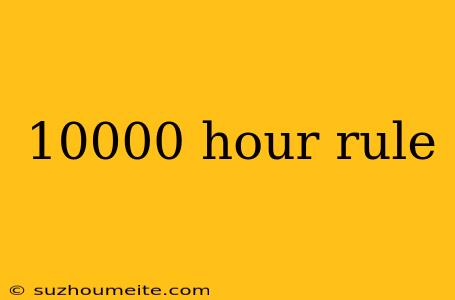The 10,000 Hour Rule: Unlocking Expertise and Mastery
Introduction
Have you ever wondered how some people become experts in their field, while others struggle to make progress? Is it due to innate talent, or is there something more to it? The 10,000 hour rule, popularized by Malcolm Gladwell in his book "Outliers," suggests that it takes a significant amount of time and dedication to become truly exceptional in any area.
What is the 10,000 Hour Rule?
The 10,000 hour rule proposes that to achieve world-class expertise in any field, one must put in a minimum of 10,000 hours of deliberate practice. This means that simply spending a lot of time doing something is not enough; the practice must be focused, intentional, and directed towards improvement.
Examples of the 10,000 Hour Rule in Action
- Bill Gates: Co-founder of Microsoft, Bill Gates spent countless hours programming as a teenager, often for 12 hours a day. By the time he was 20, he had already exceeded the 10,000 hour mark.
- The Beatles: Before they became international sensations, the Beatles performed over 1,200 shows in Germany and the UK, honing their craft and perfecting their sound.
- Tiger Woods: Golfing prodigy Tiger Woods was practicing his swing as early as age 6, and by the time he turned pro at 20, he had already put in over 10,000 hours of practice.
Principles of Deliberate Practice
While the 10,000 hour mark is often cited, it's the quality of practice that matters most. Here are some key principles of deliberate practice:
- Focus: Concentrate on specific aspects of your craft, rather than just going through the motions.
- Feedback: Seek out constructive feedback from others, and be willing to adjust your approach based on new information.
- Challenge: Push yourself beyond your comfort zone, taking on increasingly difficult tasks to stimulate growth.
Debunking the Myths
While the 10,000 hour rule has been influential, some critics argue that:
- Innate talent plays a role: While practice is essential, some people may have a natural aptitude for certain activities.
- 10,000 hours is an arbitrary number: The exact amount of time required for expertise may vary depending on the individual and the field.
Conclusion
The 10,000 hour rule serves as a reminder that expertise is not solely the result of innate talent or luck. By dedicating ourselves to deliberate practice, we can unlock our full potential and achieve mastery in our chosen fields. While 10,000 hours may seem like a daunting task, it's a reminder that the journey to excellence is a long-term commitment to growth and improvement.
Remember: 10,000 hours is not a magic number, but a milestone on the path to greatness.
